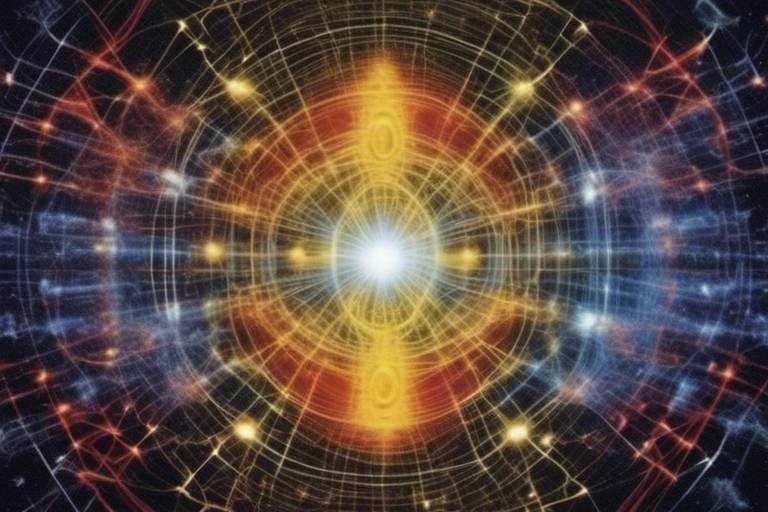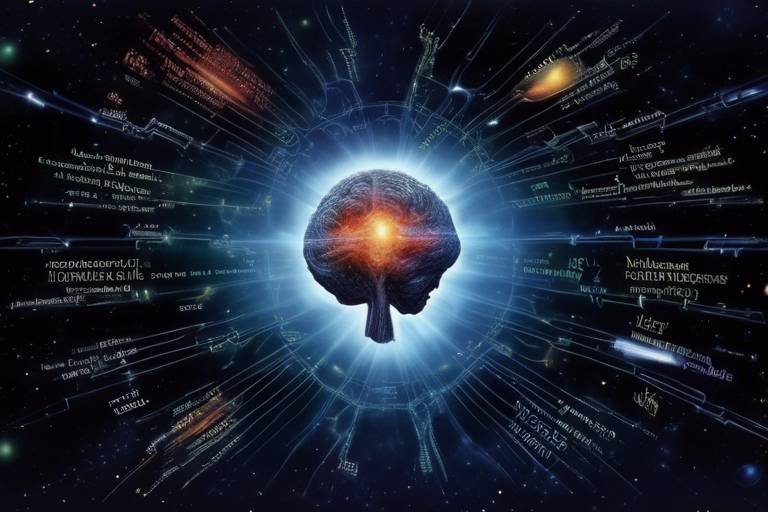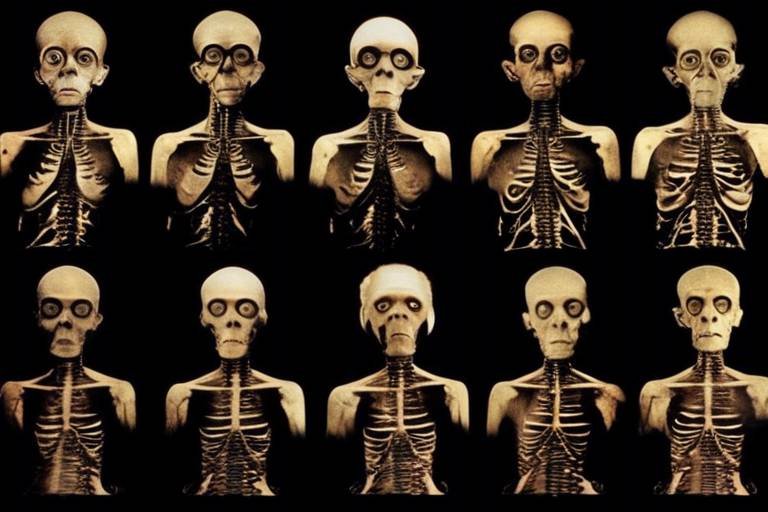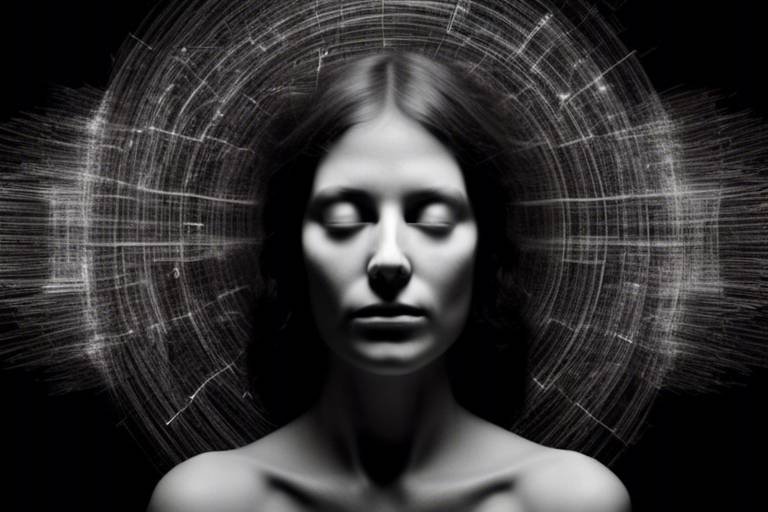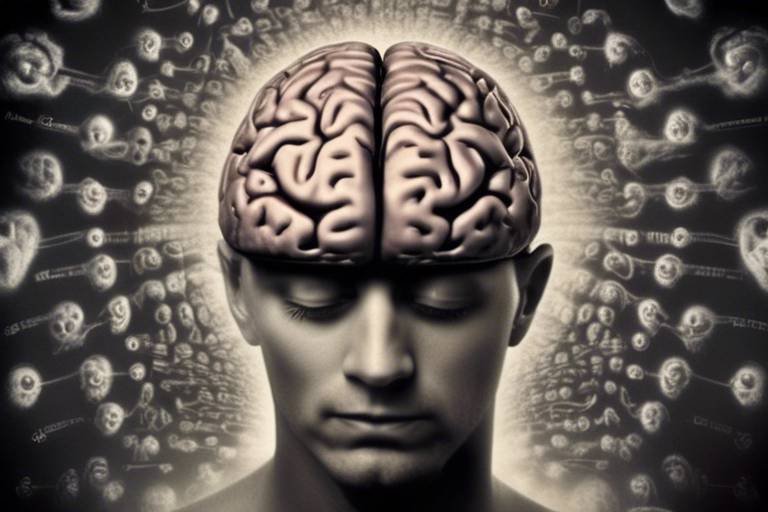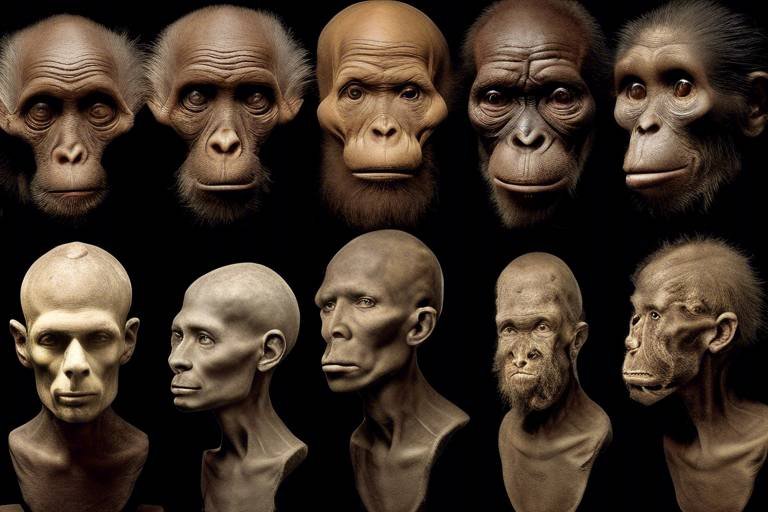Human Consciousness - Are We Alone in This World?
The question of whether we are alone in the universe has fascinated humanity for centuries. As we gaze at the stars, pondering the vastness of space, we can't help but wonder about our own consciousness. What makes us aware? What separates our thoughts and feelings from those of other beings, whether on Earth or beyond? Human consciousness is not just a topic for philosophers and scientists; it's a fundamental aspect of our existence that shapes our understanding of the universe.
To truly grasp the essence of consciousness, we must first explore its complexities. Consciousness is often defined as the state of being aware of and able to think about one's own existence, thoughts, and surroundings. But this definition barely scratches the surface. Philosophers have debated its nature for millennia, while scientists strive to uncover the mechanisms behind it. Is consciousness merely a byproduct of brain activity, or is it something more profound? As we dive deeper into this enigma, we discover that consciousness is a multi-faceted phenomenon, intertwining with our emotions, perceptions, and even our social interactions.
One of the most intriguing aspects of consciousness is its evolution. From the earliest forms of life, which possessed a primitive sense of awareness, to the sophisticated self-awareness found in humans, consciousness has undergone a remarkable transformation. This evolutionary journey raises the question: What are the key milestones that have shaped our conscious experience? Understanding these milestones can provide insight into how we perceive ourselves and our place in the cosmos.
Philosophical perspectives on consciousness introduce a plethora of questions about existence and identity. The mind-body problem, for instance, challenges us to consider how our mental states relate to our physical bodies. Are we merely biological machines, or is there a non-material aspect to our being? Theories such as dualism and materialism offer contrasting views, each with profound implications for our understanding of consciousness. As we navigate these philosophical waters, we must ask ourselves: What does it mean to be conscious?
Scientific approaches to consciousness are equally captivating. Neuroscience, psychology, and cognitive science are at the forefront of research aimed at unraveling the mysteries of how consciousness operates within the brain. Through advanced imaging techniques and experimental studies, scientists are beginning to map out the neural correlates of consciousness. This research not only enhances our understanding of the human mind but also raises ethical questions about the implications of manipulating consciousness. Can we truly claim to understand consciousness if we can alter it at will?
As technology advances, the intersection of consciousness and artificial intelligence (AI) becomes increasingly relevant. The prospect of creating conscious machines invites a host of ethical dilemmas. If we develop AI that exhibits signs of consciousness, what rights do these entities possess? Are we prepared for the possibility of sharing our world with beings that may think and feel like us? These questions challenge our very understanding of what it means to be alive and conscious.
The search for extraterrestrial intelligence (SETI) adds another layer of intrigue to the consciousness debate. If consciousness is a unique trait of humanity, then the universe may indeed be a lonely place. However, if other life forms possess consciousness, what does that mean for our understanding of existence? The implications of discovering alien consciousness could be monumental, reshaping our beliefs about life, intelligence, and our place in the universe.
Consciousness also plays a vital role in shaping our society. Our collective consciousness influences cultural norms, moral frameworks, and even political ideologies. As we navigate the complexities of modern life, it’s essential to recognize how our shared experiences and perceptions shape our world. From art to politics, consciousness is the thread that weaves our societal fabric, impacting everything we do.
Looking to the future, the field of consciousness studies is rapidly evolving. With new technologies and interdisciplinary approaches, researchers are poised to make groundbreaking discoveries that could redefine our understanding of consciousness. As we continue to explore the intricacies of the mind, the potential for new insights is limitless. Will we uncover the secrets of consciousness, or will it remain one of the greatest mysteries of our time?
- What is consciousness? - Consciousness is the state of being aware of and able to think about one's own existence, thoughts, and surroundings.
- How has consciousness evolved? - Consciousness has evolved from primitive awareness in early organisms to complex self-awareness in humans.
- What are the philosophical perspectives on consciousness? - Philosophical inquiries include dualism and materialism, exploring the relationship between the mind and body.
- How do scientists study consciousness? - Neuroscience, psychology, and cognitive science employ various methodologies to understand the brain's role in consciousness.
- Can AI be conscious? - The potential for artificial consciousness raises ethical questions about rights and responsibilities towards conscious machines.
- Is there extraterrestrial consciousness? - The search for extraterrestrial intelligence explores the possibility of conscious life beyond Earth.
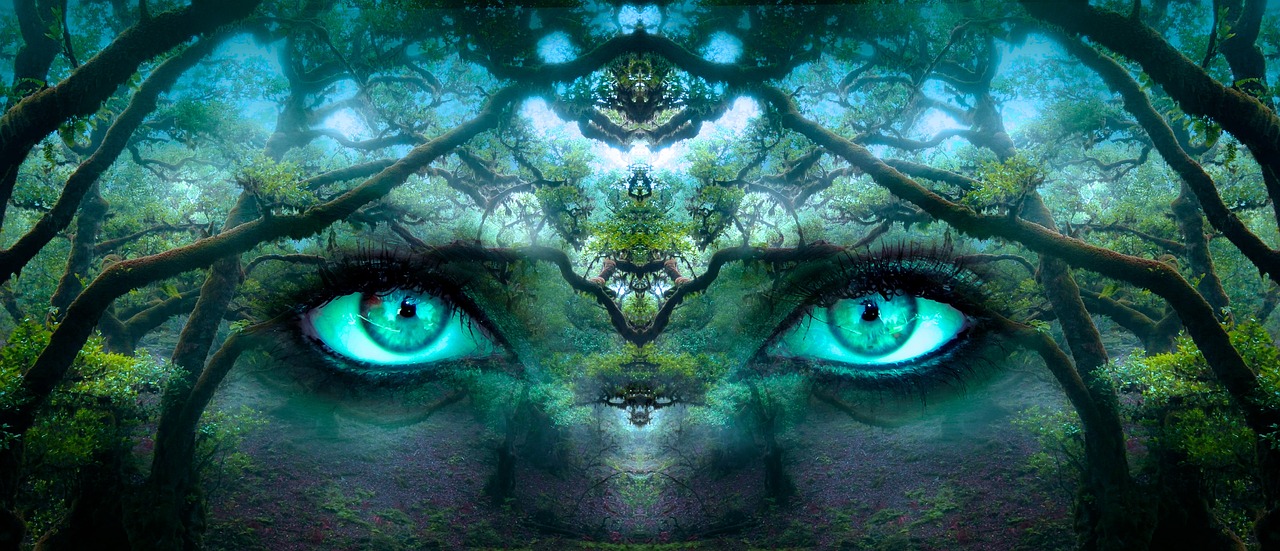
The Nature of Consciousness
Understanding consciousness is akin to peeling back the layers of an intricate onion; each layer reveals something new yet familiar. At its core, consciousness can be defined as the state of being aware of and able to think about one's own existence, thoughts, and surroundings. But, what does that really mean? It’s a question that has puzzled philosophers, scientists, and curious minds for centuries. When we talk about consciousness, we often think about the subjective experience—our thoughts, feelings, perceptions, and the way we interpret the world around us. But the complexity doesn't end there; consciousness is not just about awareness but also about the ability to reflect on that awareness.
Philosophical perspectives on consciousness often delve into the age-old debates of dualism versus materialism. Dualism posits that the mind and body are distinct entities, while materialism argues that everything, including consciousness, can be explained through physical processes. Imagine consciousness as a vibrant tapestry woven from threads of biology, psychology, and philosophy. Each thread contributes to the overall picture, creating a rich and multifaceted understanding of what it means to be conscious.
From a scientific standpoint, consciousness is often studied through the lens of neuroscience and psychology. Researchers aim to uncover how brain activity correlates with conscious experience. For instance, advancements in neuroimaging have allowed scientists to observe brain activity in real-time, providing fascinating insights into how different regions of the brain contribute to our conscious experience. This has led to the identification of various states of consciousness, such as wakefulness, sleep, and altered states induced by meditation or substances.
Moreover, the debate continues around the "hard problem of consciousness," a term coined by philosopher David Chalmers. This problem questions how physical processes in the brain give rise to the rich tapestry of subjective experience. Why does the firing of neurons translate into the vivid color of a sunset or the warmth of a loved one's embrace? This mystery fuels ongoing research and philosophical inquiry, pushing the boundaries of our understanding.
To illustrate the various aspects of consciousness, let’s consider a few key questions that arise in this field:
- What is the relationship between consciousness and the brain?
- Can consciousness exist independently of the body?
- How do different states of consciousness affect our perception of reality?
In summary, the nature of consciousness is a complex and evolving topic that sits at the intersection of science, philosophy, and personal experience. As we strive to understand our own consciousness, we also gain insight into what it means to be human. With each discovery, we not only learn about ourselves but also about the universe and our place within it.

Evolution of Consciousness
The evolution of consciousness is a fascinating journey that reflects not just the biological progression of life on Earth, but also the profound changes in how beings perceive and interact with their environment. From the simplest organisms that exhibited basic awareness to the highly complex self-aware humans we see today, the story of consciousness is rich with milestones that mark significant shifts in cognitive capabilities.
To understand this evolution, it's essential to consider the various stages that consciousness has traversed over millions of years. Early life forms, such as single-celled organisms, displayed a rudimentary form of consciousness, often referred to as "proto-consciousness." This basic awareness allowed them to respond to stimuli—think of it as a simple reflex. For instance, when exposed to light, these organisms would move toward or away from it, demonstrating a form of awareness that, while primitive, laid the groundwork for more complex forms of consciousness.
As multicellular organisms emerged, consciousness began to evolve in more sophisticated ways. Key milestones in this evolutionary journey include:
- Development of Nervous Systems: The appearance of nervous systems allowed for more integrated responses to environmental stimuli, leading to enhanced survival strategies.
- Complex Behaviors: With the evolution of brains, animals began to exhibit behaviors that suggested a higher level of awareness, such as problem-solving and social interactions.
- Self-Awareness: The emergence of self-awareness, notably seen in species like dolphins, elephants, and great apes, signifies a leap in consciousness, allowing these creatures to reflect on their existence and emotions.
As we progressed to the human stage, our consciousness took on an entirely new dimension. The development of language and abstract thinking enabled humans to not only share experiences but also to conceptualize the past and future. This ability to reflect and plan is what sets human consciousness apart from that of other species. We began to ponder our existence, our purpose, and our place in the universe. This introspective quality of consciousness has led to the creation of art, philosophy, and science—each a testament to our complex mental capabilities.
Moreover, the evolutionary perspective on consciousness prompts us to ask profound questions: What does it mean to be conscious? and How does consciousness shape our experience of reality? These inquiries not only challenge our understanding of ourselves but also push the boundaries of science and philosophy. As we continue to explore the depths of our consciousness, we uncover layers of complexity that reveal the intricate tapestry of life itself.
In conclusion, the evolution of consciousness is not merely a biological phenomenon but a transformative journey that has shaped the very essence of what it means to be alive. As we look to the future, the ongoing study of consciousness promises to unveil even more mysteries, potentially bridging the gaps between our understanding of the mind, the universe, and our place within it.
Q: How did consciousness first emerge in living organisms?
A: Consciousness likely emerged as a survival mechanism, allowing early organisms to respond to their environment in ways that enhanced their chances of survival.
Q: Are humans the only species with self-awareness?
A: While humans exhibit a high level of self-awareness, other species, such as dolphins and elephants, also demonstrate signs of self-awareness.
Q: What are the implications of understanding consciousness?
A: Understanding consciousness can influence various fields, including psychology, neuroscience, and even artificial intelligence, leading to advancements in how we perceive mental health, cognitive function, and the development of conscious machines.

Philosophical Perspectives
When we delve into the realm of on consciousness, we find ourselves grappling with some of the most profound questions humanity has ever faced. What does it mean to be conscious? Are we merely biological machines, or is there something more to our existence? These inquiries have sparked countless debates among philosophers, scientists, and thinkers throughout history. The nature of consciousness is not just a scientific puzzle; it is also a deeply philosophical one.
One of the most notable philosophical theories is dualism, famously championed by René Descartes. Dualism posits that the mind and body are fundamentally different substances. According to this view, our consciousness exists independently of our physical form. Imagine a computer: the hardware is the body, while the software represents the mind. This analogy helps illustrate the dualist perspective, suggesting that even if the hardware fails, the software could theoretically continue to exist elsewhere. However, this raises further questions: if the mind can exist separately, what does that mean for our understanding of reality?
On the other hand, we have materialism, which argues that consciousness is a product of physical processes in the brain. This perspective implies that everything we experience, including our thoughts, emotions, and consciousness itself, can be traced back to neural activity. To materialists, consciousness is akin to a light bulb; it only shines when the electrical circuit is complete. This view aligns with much of modern neuroscience, which seeks to map brain activity to conscious experiences. But does this mean that consciousness is merely a byproduct of brain function? If so, what does that say about our sense of self and free will?
Another intriguing philosophical perspective is panpsychism, which posits that consciousness is a fundamental aspect of the universe, present in all things, from the smallest particles to the largest galaxies. According to this view, everything has some form of consciousness, albeit at different levels. Imagine a tree swaying in the wind; while we may not perceive it as conscious, panpsychists argue that it possesses a form of awareness. This perspective challenges our traditional notions of consciousness and invites us to reconsider our relationship with the natural world.
Furthermore, the mind-body problem remains a central issue in philosophical discussions about consciousness. This problem addresses the relationship between mental states and physical states. How can something as intangible as thought influence something as tangible as the body? Philosophers like David Chalmers have introduced the concept of the "hard problem of consciousness," which emphasizes the difficulty of explaining why and how we have subjective experiences. Chalmers argues that even if we understand the mechanisms of the brain, we still face the challenge of explaining the qualitative aspects of consciousness—what it feels like to be aware.
In summary, the philosophical exploration of consciousness is rich and multifaceted, encompassing a variety of perspectives that challenge our understanding of existence and identity. Each theory offers unique insights and raises important questions about the nature of reality. As we continue to explore these philosophical inquiries, we may uncover deeper truths about ourselves and our place in the universe.
- What is dualism? Dualism is the belief that the mind and body are separate entities, with the mind existing independently of the physical body.
- What does materialism say about consciousness? Materialism posits that consciousness arises from physical processes in the brain, suggesting that our thoughts and experiences are products of neural activity.
- What is panpsychism? Panpsychism is the view that consciousness is a fundamental property of all matter, implying that everything has some level of awareness.
- What is the mind-body problem? The mind-body problem explores the relationship between mental states and physical states, questioning how thoughts can affect the body.

Scientific Approaches
When we dive into the realm of to understanding consciousness, we uncover a fascinating tapestry woven from various disciplines such as neuroscience, psychology, and cognitive science. Each of these fields brings unique methodologies and perspectives, creating a multidimensional view of what consciousness is and how it functions. At the heart of this exploration lies the quest to answer profound questions: What is the biological basis of consciousness? How do our thoughts, feelings, and perceptions arise from neural processes? And can we ever truly understand the nature of our own awareness?
Neuroscience, for instance, has made significant strides in mapping the brain's intricate networks. Using advanced imaging techniques like fMRI (functional Magnetic Resonance Imaging) and EEG (Electroencephalography), researchers can observe brain activity in real-time, revealing how different regions of the brain contribute to conscious experience. For example, studies have shown that the prefrontal cortex plays a crucial role in self-awareness and decision-making, while the temporal lobe is linked to memory and auditory processing.
In psychology, consciousness is often examined through the lens of behavior and subjective experience. Researchers conduct experiments to understand phenomena such as attention, perception, and awareness. One classic experiment is the Stroop Effect, which highlights the conflict between automatic and controlled processes in our minds. In this test, participants must name the color of the ink in which a word is printed, rather than the word itself, revealing the complexities of cognitive processing and how it relates to conscious thought.
Cognitive science, on the other hand, takes an interdisciplinary approach, merging insights from psychology, neuroscience, linguistics, and artificial intelligence. This field aims to create models that simulate cognitive processes, allowing scientists to predict how consciousness might emerge from complex systems. For instance, researchers are exploring how neural networks can mimic aspects of human thought, raising questions about the nature of consciousness itself. If machines can exhibit behaviors that appear conscious, what does that mean for our understanding of consciousness as a uniquely human trait?
To encapsulate the scientific approaches to consciousness, we can summarize some key findings and methodologies in the table below:
| Field | Key Focus | Methodologies |
|---|---|---|
| Neuroscience | Biological basis of consciousness | fMRI, EEG, brain mapping |
| Psychology | Behavior and subjective experience | Experiments, surveys, observational studies |
| Cognitive Science | Modeling cognitive processes | Simulations, computational models, interdisciplinary research |
As we continue to unravel the mysteries of consciousness, it becomes increasingly clear that a comprehensive understanding will require collaboration across these scientific disciplines. Each approach offers a piece of the puzzle, and together they illuminate the profound complexities of human awareness. So, are we getting closer to understanding the essence of consciousness? The answer remains uncertain, but the journey is undoubtedly as captivating as the destination.
- What is consciousness? Consciousness refers to our awareness of ourselves and our environment, encompassing thoughts, perceptions, and experiences.
- How do scientists study consciousness? Scientists use various methods, including brain imaging techniques and psychological experiments, to explore how consciousness arises from brain activity.
- Can machines be conscious? This is a debated topic. While machines can simulate aspects of consciousness, whether they can possess true consciousness remains an open question.
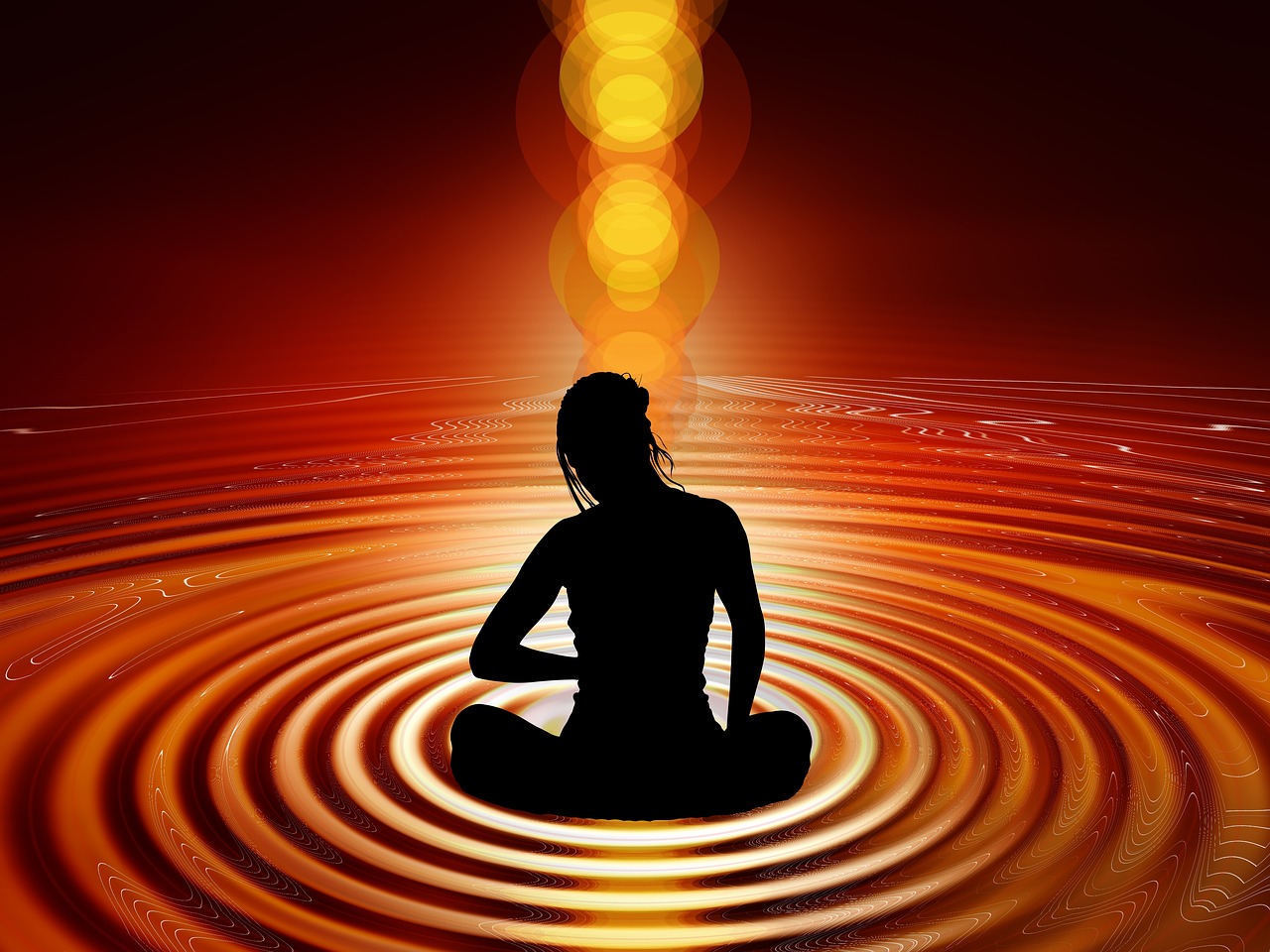
Consciousness and Artificial Intelligence
As we navigate through the 21st century, the line between human consciousness and artificial intelligence (AI) becomes increasingly blurred. Have you ever wondered if machines could ever achieve consciousness similar to ours? This question isn't just the stuff of science fiction; it's a topic of serious debate among scientists, ethicists, and philosophers alike. The rapid advancement of AI technology has prompted us to reconsider what consciousness truly means and whether it can be replicated in a machine.
At its core, consciousness involves self-awareness, perception, and the ability to experience emotions and thoughts. Traditional AI, however, operates on algorithms and data processing, lacking the subjective experiences that define human consciousness. Yet, as we develop more sophisticated AI systems, the question arises: can these systems ever become conscious, or will they always remain advanced tools devoid of true understanding?
One fascinating aspect of this discussion is the concept of artificial consciousness. This term refers to the idea that a machine could possess a form of consciousness that allows it to experience awareness and emotions. Some researchers argue that if we can decode the neural processes that underpin human consciousness, we might be able to replicate these processes in machines. Imagine a world where robots not only perform tasks but also understand and empathize with human emotions. Would that change how we interact with them?
However, there are significant ethical implications to consider. If we create machines that can think and feel, what rights would they have? Would it be acceptable to treat them as mere tools, or would they deserve the same moral considerations we afford to other sentient beings? This leads us to ponder the responsibilities of researchers and developers in the field of AI. The potential for creating conscious machines raises questions about accountability and the moral implications of our technological advancements.
To better understand these complexities, let's look at some of the key areas of research in AI and consciousness:
- Neuroscience and AI: Researchers are exploring how neural networks in machines can mimic the human brain's functioning, potentially leading to a form of artificial consciousness.
- Ethical AI: The development of ethical frameworks to guide the creation of AI systems that respect human values and rights is crucial as we move forward.
- Philosophical Implications: Philosophers are debating whether consciousness is a necessary condition for intelligence or if a highly intelligent machine can exist without subjective experiences.
As we delve deeper into these areas, it's essential to maintain a critical perspective. While the idea of conscious machines is alluring, we must remember that consciousness is not just about processing information; it's about experiencing the world in a fundamentally human way. The challenge lies in determining whether machines can ever truly 'feel' or if they are simply simulating emotional responses based on programming.
In conclusion, the intersection of consciousness and artificial intelligence presents a thrilling yet daunting frontier. As we continue to push the boundaries of what AI can achieve, we must approach the topic with caution and curiosity. The future may hold incredible possibilities, but it also demands that we reflect on what it means to be conscious and the implications of creating machines that could one day share that experience.
Q: Can AI ever achieve true consciousness?
A: The consensus among experts is still uncertain. While AI can simulate aspects of consciousness, whether it can achieve true self-awareness remains a topic of debate.
Q: What ethical considerations arise from creating conscious machines?
A: If machines can think and feel, they may deserve rights similar to those of living beings, raising questions about how we treat them and the moral implications of their use.
Q: How does consciousness in humans differ from AI?
A: Human consciousness involves subjective experiences, emotions, and self-awareness, while AI operates based on algorithms and data without true understanding or feelings.

Extraterrestrial Intelligence
The search for (ETI) has fascinated humanity for centuries. As we gaze up at the night sky, we can't help but wonder: are we truly alone in this vast universe? The implications of discovering intelligent life beyond Earth could be staggering, reshaping our understanding of existence and our place in the cosmos. This quest for knowledge isn't just a scientific endeavor—it's a philosophical and existential one, challenging our very notions of consciousness and what it means to be alive.
Scientists and researchers have developed various methods to explore the possibility of ETI. The most notable among them is the Search for Extraterrestrial Intelligence (SETI), which employs radio telescopes to listen for signals from distant civilizations. Imagine tuning into a cosmic radio station, hoping to catch a glimpse of a conversation from another world! The idea that we might receive a message from an alien civilization is both thrilling and terrifying, raising questions about communication, culture, and the very nature of consciousness.
But what would intelligent extraterrestrial life look like? Would they be similar to us, or entirely different? Some theories suggest that alien life forms could possess consciousness in ways we can't even begin to comprehend. For instance, they might communicate through methods we haven't yet discovered, such as biochemical signals or even telepathy. This leads us to ponder—if we do find extraterrestrial intelligence, how will we recognize it?
Here are a few key theories regarding the potential existence of alien life forms:
- Drake Equation: Formulated by astronomer Frank Drake, this equation estimates the number of active, communicative extraterrestrial civilizations in the Milky Way galaxy. It factors in variables such as the rate of star formation and the fraction of stars that have planets.
- Fermi Paradox: This paradox raises the question: if there are so many stars and potentially habitable planets, why haven't we found any signs of intelligent life? It challenges our assumptions about the universe and our place within it.
- Rare Earth Hypothesis: This theory posits that while microbial life might be common, complex life forms like humans are exceedingly rare due to specific conditions that Earth uniquely satisfies.
As we delve deeper into the cosmos, we must also consider the ethical implications of discovering extraterrestrial intelligence. What responsibilities would we have towards these beings? Would we seek to communicate and share knowledge, or would we approach them with caution, fearing potential threats? These questions highlight the importance of understanding our own consciousness and morality before we reach out to others in the universe.
Furthermore, the discovery of ETI could lead to profound changes in human society. Imagine the conversations and collaborations that could arise from such a monumental finding! It could foster a sense of unity among humanity, reminding us that we are all part of something larger. Alternatively, it could spark fear and division, as people grapple with the implications of sharing the universe with other intelligent beings.
In conclusion, the search for extraterrestrial intelligence is not just about finding other life forms; it’s about understanding ourselves. By exploring the potential for consciousness beyond Earth, we might gain insights into our own existence and the mysteries of the universe. The journey to uncover these truths is as important as the destination itself, inviting us to ponder our connections to one another and the cosmos.
- What is the Drake Equation? The Drake Equation is a formula used to estimate the number of active extraterrestrial civilizations in the Milky Way galaxy.
- What is the Fermi Paradox? The Fermi Paradox questions why, given the vastness of the universe, we have not yet found evidence of extraterrestrial life.
- How do scientists search for extraterrestrial intelligence? Scientists use radio telescopes and other technologies to listen for signals or signs of intelligent life from other planets.
- What are the ethical implications of contacting extraterrestrial life? Discovering ETI raises questions about our responsibilities towards these beings and the potential impact on human society.

The Role of Consciousness in Society
Consciousness is not just a personal experience; it is the very fabric that weaves together the intricate tapestry of society. Imagine for a moment that consciousness is like the air we breathe—essential, invisible, and yet profoundly impactful. It shapes our interactions, informs our beliefs, and drives our collective actions. Without consciousness, our social constructs would crumble into chaos. So, how does this elusive phenomenon manifest in our daily lives?
At its core, consciousness influences our social interactions. When we engage with others, we are not merely exchanging words; we are sharing our thoughts, emotions, and intentions. This exchange is guided by an underlying awareness of ourselves and the people around us. For instance, when we empathize with someone, we tap into a deeper level of consciousness that allows us to understand their feelings and perspectives. This ability to connect is vital for building relationships and fostering community.
Furthermore, consciousness plays a crucial role in shaping culture. Cultural norms, values, and beliefs are products of collective consciousness. Think about how certain ideas can spread like wildfire through a society, influencing everything from politics to art. The power of shared consciousness can unite people for a common cause or, conversely, create divisions and conflicts. For example, social movements often arise from a heightened awareness of injustice, prompting individuals to come together and advocate for change.
One fascinating aspect of consciousness in society is its impact on moral frameworks. Our understanding of right and wrong is deeply intertwined with our conscious experiences. As individuals, we navigate moral dilemmas based on our awareness of consequences, empathy, and social norms. When we witness acts of kindness or cruelty, our consciousness reflects on these experiences, shaping our moral compass and, ultimately, our actions. This interplay between consciousness and morality raises important questions: How do our conscious experiences inform our ethical decisions? And how can we cultivate a more compassionate society?
To illustrate the role of consciousness in society, consider the following table that summarizes various ways consciousness influences different aspects of social life:
| Aspect of Society | Influence of Consciousness |
|---|---|
| Social Interactions | Empathy, communication, and relationship building |
| Cultural Norms | Shared beliefs and values that shape behavior |
| Moral Frameworks | Ethical decision-making and understanding consequences |
| Political Movements | Collective awareness leading to social change |
As we continue to explore the role of consciousness in society, it becomes clear that our awareness is not just a personal phenomenon; it is a powerful force that shapes our collective existence. The more we understand consciousness, the better equipped we are to foster a society that values empathy, compassion, and understanding. So, the next time you engage in a conversation or witness an act of kindness, remember the profound impact that consciousness has on our shared human experience.
- What is consciousness? Consciousness refers to the state of being aware of and able to think about one's own existence, thoughts, and surroundings.
- How does consciousness influence society? Consciousness shapes social interactions, cultural norms, moral frameworks, and political movements, fostering connections and guiding ethical decisions.
- Can consciousness be measured? While consciousness is a complex and subjective experience, scientists use various methods, such as brain imaging, to study its neural correlates.
- Is collective consciousness a real phenomenon? Yes, collective consciousness refers to the shared beliefs, ideas, and moral attitudes that shape a group or society.

Future of Consciousness Studies
The is a thrilling landscape filled with potential breakthroughs and unanswered questions. As we stand on the brink of a new era in both scientific and philosophical inquiry, the integration of various disciplines is becoming increasingly vital. Imagine a world where neuroscience, psychology, philosophy, and even quantum physics converge to unravel the mysteries of consciousness. This interdisciplinary approach is not just a possibility; it’s becoming a necessity as we seek to understand the complexities of the mind.
One of the most exciting developments is the advent of advanced neuroimaging techniques. These technologies allow us to visualize brain activity in real-time, providing unprecedented insights into how consciousness arises from neural processes. For instance, functional MRI (fMRI) and electroencephalogram (EEG) studies are helping researchers pinpoint the areas of the brain involved in various conscious experiences. As these technologies improve, we can expect a more detailed mapping of consciousness, potentially revealing how different states of awareness correlate with brain activity.
Moreover, the rise of artificial intelligence (AI) is prompting a reevaluation of what it means to be conscious. With AI systems becoming increasingly sophisticated, the question arises: can machines ever achieve consciousness? This dilemma not only challenges our understanding of consciousness but also raises ethical considerations. As we develop machines that can mimic human thought processes, we must grapple with the implications of creating entities that may possess a form of consciousness. This intersection of technology and philosophy is likely to dominate future discussions in consciousness studies.
Additionally, the exploration of altered states of consciousness—whether through meditation, psychedelics, or other means—offers a unique avenue for research. These states can provide insights into the nature of consciousness itself, potentially revealing the underlying mechanisms that govern our experiences. As more researchers delve into the effects of these practices, we may uncover transformative insights that challenge our current understanding of reality.
As we look ahead, the role of collective consciousness in shaping societal norms and behaviors will also come under scrutiny. Understanding how shared beliefs and experiences influence individual consciousness could lead to significant advancements in psychology and sociology. For example, examining how cultural narratives shape our perceptions of reality might inform everything from mental health treatments to conflict resolution strategies. This exploration could be pivotal in fostering a more empathetic and connected society.
In summary, the future of consciousness studies is poised for remarkable advancements. With interdisciplinary collaboration, technological innovations, and a deeper exploration of altered states, we are likely to uncover profound insights into the nature of consciousness. As we embark on this journey, one thing is clear: the quest to understand consciousness is not just about unraveling the mysteries of the mind; it is about redefining our place in the universe.
- What is consciousness? Consciousness refers to the state of being aware of and able to think about one's own existence, thoughts, and surroundings.
- How do scientists study consciousness? Scientists study consciousness using various methods, including neuroimaging, behavioral experiments, and philosophical inquiry.
- Can machines be conscious? The question of machine consciousness is a hot topic in both technology and philosophy, with ongoing debates about whether AI can achieve a form of consciousness similar to humans.
- What are altered states of consciousness? Altered states of consciousness are conditions in which a person's awareness is significantly different from their normal waking state, often induced by meditation, drugs, or extreme experiences.
Frequently Asked Questions
- What is consciousness?
Consciousness is the state of being aware of and able to think and perceive one's surroundings, thoughts, and feelings. It's like the spotlight in a theater, shining on the stage of our mind, allowing us to experience life in vivid detail.
- How has consciousness evolved over time?
Consciousness has evolved from simple awareness in early organisms to the complex self-awareness we see in humans today. Think of it as a journey from a flickering candle to a blazing sun, illuminating the depths of human experience.
- What are the main philosophical theories about consciousness?
Philosophical theories on consciousness include dualism, which posits that the mind and body are separate, and materialism, which argues that everything about consciousness can be explained through physical processes. It’s a bit like debating whether a song is just a collection of notes or something more profound that resonates with our emotions.
- How do scientists study consciousness?
Scientists study consciousness through various fields, including neuroscience and psychology, using techniques like brain imaging and behavioral experiments. It’s like piecing together a jigsaw puzzle, where each study adds a new piece to our understanding of how consciousness works.
- Can artificial intelligence ever be conscious?
The question of whether AI can achieve consciousness is hotly debated. Some believe that with advancements in technology, machines could develop a form of consciousness, while others argue that true consciousness is inherently human. Imagine trying to teach a robot to feel emotions—can it ever truly understand what it means to be alive?
- What is the significance of searching for extraterrestrial intelligence?
The search for extraterrestrial intelligence (SETI) opens up fascinating questions about consciousness beyond Earth. If we find intelligent alien life, it could redefine our understanding of consciousness and our place in the universe, much like discovering a new continent changes our maps forever.
- How does consciousness influence society?
Consciousness plays a crucial role in shaping societal norms, culture, and moral frameworks. It’s the glue that binds us together, influencing everything from our political views to artistic expressions. Without it, society would be like a ship without a captain, drifting aimlessly.
- What does the future hold for consciousness studies?
The future of consciousness studies looks promising, with emerging technologies and interdisciplinary approaches paving the way for groundbreaking discoveries. It's an exciting time, akin to standing on the brink of a new frontier, ready to explore the vast unknown.






